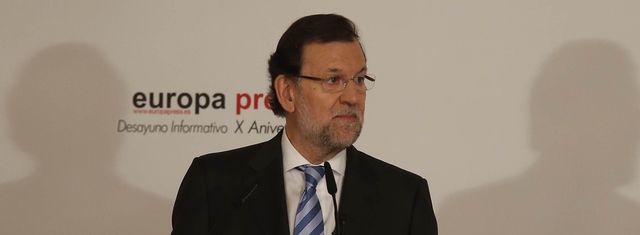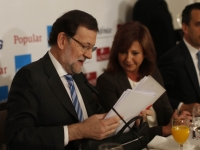Politics
Rajoy announced that the Spanish economy will grow 2.9% in 2015
And a similar amount in 2016

Spanish economy will grow 2.9% this year (Source: Pool Moncloa)
Mariano Rajoy moved that Spain will be the euro economy that's growing between large, "with considerable difference from the average of the eurozone". He said in 2015 the Spanish economy will grow 2.9% and for 2016, "the amount will be of the same tenor". However, he warned that, if these forecasts are met, it is necessary to "maintain the reform momentum that has guided us throughout the legislature." The Prime Minister also stressed the priority to be given in the Budget 2015 to R + D + i, "with increased allocations of nearly five percent."
On the other hand, the chief executive explained that the real cause of poverty and inequality is unemployment. "It's the crisis, not the fight against the crisis, which threatens social policies. Therefore, we have made the job creation our main priority, "and defended the welfare state," something that does not exist anywhere else in the world." However, he said, "keep the Welfare State in a global and competitive world requires us to be extremely ambitious in the reform-minded and extremely effective and balanced management of resources."
According to the president of the Spanish government, economic stability and reforms are the elements that should guide the future of Spain. He also recalled what the "great national objective," a completely objective "possible" reach twenty million jobs. "It is the threshold that guarantees the sustainability of our welfare state," said Rajoy, who recalled how he was Spain in 2005: "Spain was living a peaceful economic situation." He explained that ten years ago "nobody paid attention to the importance and need for reform disdain," so that "the Spanish economy accumulated lethal imbalances that caused the greatest crisis in generations Spain has suffered."
The Spanish prime minister added that these serious imbalances in the Spanish economy resulted in recession, with the consequent rise in unemployment -3.4 million people lost their jobs between 2008 and 2011- and plummeting revenues 70,000 million euros as well and great difficulty finding financing. According Rajoy, two prescriptions were suggested: leave the euro or seek bailout Europe. However, the Executive chose a third way that was "neither the easiest nor the fastest," but, understood, itself was "the fairest, the most successful and most enduring.“ The Government took the road of reforms to improve competitiveness and regain the path of economic growth and job creation.
In this sense, Rajoy said the government action plan was based on three pillars: a program of fiscal consolidation, restructuring of the financial system and the reforms needed to regain competitiveness. All these reforms, he added, "referred to collectively represent the largest and most resounding modernization effort that Spain has experienced in recent history.“ Rajoy said that "as a result of these policies, the country's situation clearly has redirected" since they have corrected the fundamental imbalances and gained competitiveness.
Liability for this article lies with the author, who also holds the copyright. Editorial content from USPA may be quoted on other websites as long as the quote comprises no more than 5% of the entire text, is marked as such and the source is named (via hyperlink).






